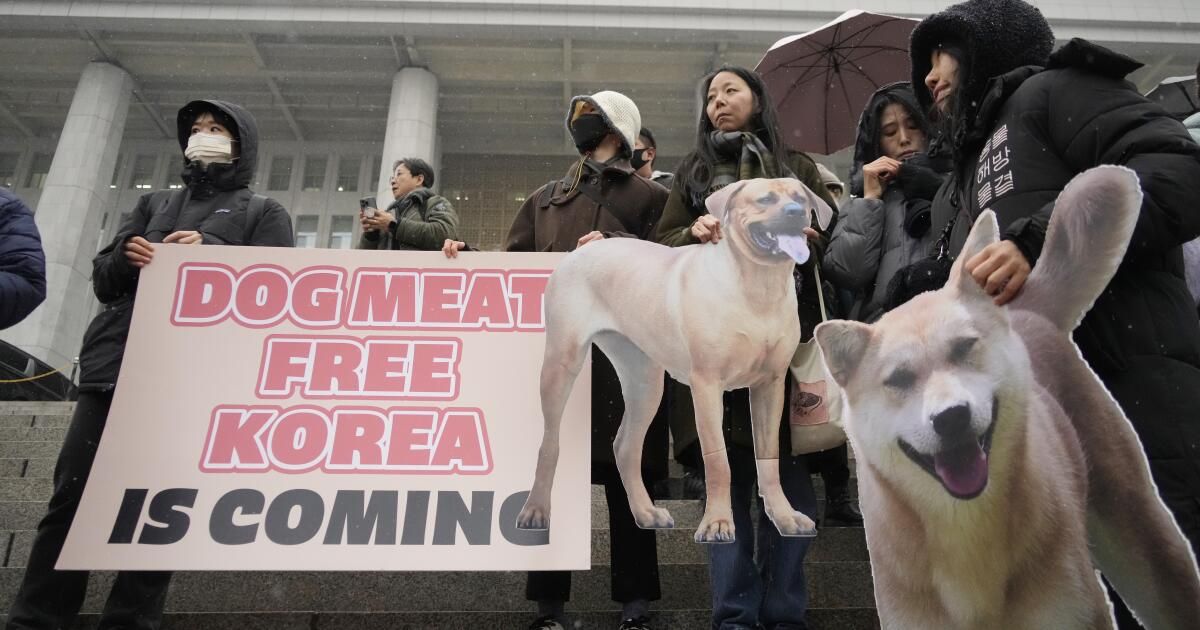Long considered by some South Koreans as a food that could revive energy in the summer months, dog meat has officially come to an end as a staple product in the East Asian nation.
a new law, which will take effect in 2027, prohibits the breeding, slaughter and sale of dogs for meat. It was approved in a nearly unanimous vote by South Korea's National Assembly last week.
Hailed by local and international animal rights groups, the ban will end a long and often bitter debate that has followed decades of social change during which South Korea has seen its global profile explode, and the practice, considered morally objectionable by much of the world, become an increasing burden on public relations.
“It was on its way to extinction on its own,” said Joo Young-ha, a food anthropologist based in South Korea. “But the law is, of course, important in the sense that it reflects changing attitudes in the country towards the consumption of dog meat.”
::
Meat of dog It has been eaten on the Korean Peninsula for centuries.
In the era of dynastic kingdoms, cows were used as a valuable form of agricultural labor rather than food, and pigs were considered unclean.
In recent decades, as South Korea has prospered and other forms of meat have become more abundant, the dog meat trade has persisted in a legal gray area, neither explicitly prohibited nor regulated by livestock or safety laws. food of the country.
Because it is rarely sold in markets or grocery stores, few prepare dog meat at home. In restaurants, it is most commonly served as a soup called bosintang, which costs about $10. Those who eat it are generally elderly South Koreans with a foot that remains in a bygone era.
“Some of my customers look for it as restorative food after major surgery,” said Song Bong-ho, 71, owner of a restaurant in western Seoul, one of the few establishments that still serves dog meat in the city. zone. .
But dog meat, increasingly associated with the unhealthy and inhumane conditions of breeding and slaughter resulting from its unregulated status, has come to be rejected by young people.
And at a time when 1 in 4 South Koreans owns a pet (and pet strollers are outselling baby strollers at a major online retailer), potential customers are likely to view dogs as companions rather than food.
A survey conducted by a local animal rights group last year found that 93.4% of respondents did not wish to consume dog meat. Today, about 1,600 restaurants nationwide still have dog meat on their menu, up from 6,400 in 1998.
::
The reputational consequences of eating dog meat have also taken their toll.
Every major international event, starting with the Seoul Olympics in 1988, has unleashed vehement activism and fueled controversy.
That year, Seoul's municipal government moved dog meat restaurants into alleys, away from the apprehensive eyes of visitors.
Before the 2002 World Cup, French actress and animal rights activist Brigitte Bardot, a prominent caninophile who fed her dogs boiled chicken breast and pureed vegetables, drew criticism from South Koreans for describing the practice. of eating dog meat as “savage” in an interview. with a local journalist.
More recently, animal rights activists pushed to boycott the 2018 Winter Olympics in Pyeongchang, stating in a petition that “South Koreans genuinely believe that the more the dog is made to suffer, the more it will enrich the quality of the meat.” .
These incendiary forms of activism have been instrumental in pressuring the country to conform to a more Westernized standard.
But they have also sometimes sparked acts of racism far beyond the Korean peninsula.
“Stop AAPI Hate has received numerous reports of acts of hate surrounding the use of this racist trope,” said Cynthia Choi, co-founder of the civil rights group. “For example, a woman in Illinois reported, “While I was walking my dog, someone yelled at me, 'That's animal abuse, I'm going to call 311 because I know you're going to cook your dog.'”
Tasty Thai, a restaurant in Fresno, was reportedly forced to close recently after a social media post claiming it served dog meat went viral.
“We saw the impact of anti-Asian racism in restaurants peak during the height of the COVID-19 pandemic,” Choi said. “We have a long way to go to change the narrative and end this type of intolerance.”
::
For others, dog meat has served as a provocative exercise in reflection on the arbitrariness of the moral value that humans assign to animals.
Ethicists such as Peter Singer, for example, have argued against speciesism: the idea that dogs should be considered off-limits while pigs, an animal that is no less intelligent, are commonly accepted as food.
Although reliable statistics on dog meat in South Korea are scarce, a recent government survey found that around 390,000 dogs are slaughtered for consumption each year in the country, while animal rights groups claim the figure is close to a million. Instead, 18 million pigs are slaughtered every year.
“Ending the use of dogs for meat in Korea would be a small but significant step toward reducing the immense suffering inflicted on animals in that country,” Singer, a vegan, recently told a local newspaper. “But ending the use of pigs for meat would be much more significant.”
Paying homage to Jonathan Swift's 1729 essay “A Modest Proposal,” which proposed that the poor should sell their children as food to the rich, writer and animal rights activist Jonathan Safran Foer posed a similar question in a satirical essay titled “Let them eat dog.” in 2009.
Questioning the morality of eating farmed meat while millions of abandoned dogs and cats are euthanized annually, Foer wrote: “The simple disposal of these euthanized dogs is a huge ecological and economic problem. But to eat those stray dogs, those runaway dogs, those dogs that are not cute enough to be kept and that are not well-behaved enough to be kept would be to kill a flock of birds with one stone and eat them too. .”
Applying this logic to heart, some in South Korea have suggested that the country simply legalize dog meat and subject it to the same rules as other livestock animals.
But neither this proposal nor broader questions about animal welfare in general were successful.
“I would have liked the dog meat debate to lead to a broader examination of the ethics of factory farming, especially now that foods like Korean fried chicken are becoming popular globally,” said Joo, the food anthropologist. . “But that unfortunately did not happen. The country simply washed its hands of it in silence.”
::
The government has yet to announce details about how the new law will be implemented, but practical challenges abound.
The Korean Dog Meat Association., a group representing the interests of dog meat farmers, has clashed with the government over the issue of compensation. Under the bill, farmers are eligible to receive financial assistance to cover the costs of dismantling their operations and transitioning to new livelihoods.
“Most of them are in their 60s and 70s and find it difficult to transition to new careers,” said Joo Young-bong, the group's leader. “We are asking for additional compensation to cover five years of lost income.”
No less complicated is the fate of the dogs.
Although the law deals a final blow to the dog meat trade, the rise of pet ownership in South Korea has also led to increased abandonment. With many animal shelters across the country reporting overflows, there is concern that many of the dogs released from farms will simply have to be sacrificed.
For animal rights groups that have been campaigning against dog meat in the country, such as Washington-based Humane Society International, one solution is to send rescued dogs to countries abroad, such as the United States.
Despite a overcrowding crisis At animal shelters across the country, many are willing to pay premiums of up to $2,000 or more to adopt dogs from the meat trade.
“Potential adopters are certainly intrigued by the unique survival stories of these dogs who have endured so much hardship and deserve a second chance at happiness,” said Dr. Katherine Polak, vice president of companion animals at HSI.
But the group, which has arranged the adoption of about 2,700 dogs rescued from South Korean meat farms since 2015, says treating, rehabilitating and transporting the dogs is expensive, although it did not provide a concrete figure.
“The burden of rescue cannot fall solely on charities,” said Lee Sang-kyung, an activist with the organization's local branch. “What we need to see from the Korean government is an adequately funded and strategically planned rescue component for removal.”












